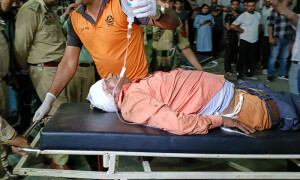
BAGHDAD: Civilian deaths from violence in Iraq are on track to be the lowest number this year since the 2003 US-led invasion, according to a preliminary report released on Thursday by a monitoring group.
Iraq Body Count (IBC), an independent Britain-based group, put the number of civilian deaths in Iraq as of December 23 at 3,976, down 713 from 4,680 in 2009.
The group will release final statistics after the end of the year.
An AFP tally based on data released by the Iraqi defence, interior and health ministries shows 2,416 civilians were killed until the end of November 2010, compared with 2,800 for all of 2009.
Government figures for December are not yet available.
In its report on 2009, IBC said data from the second half of the year showed about the same number of civilian deaths as in the first half, which “may indicate that the situation is no longer improving.”
The statistics up to December 23 this year bear out that observation, IBC’s 2010 report said.
The preliminary statistics for 2010 “showed the smallest year-on-year reduction (proportionally as well as in absolute terms) since violence levels began to reduce from late 2007 onwards,” it said.
“2008 reduced deaths by 63 per cent on 2007, 2009 by 50 per cent on 2008, but 2010 only improved by 15 per cent on 2009.
“Taken as a whole and seen in the context of immediately preceding years, the 2010 data suggests a persistent low-level conflict in Iraq that will continue to kill civilians at a similar rate for years to come.”
Reported non-combatant Iraqi deaths “resulting directly from actions involving US-led coalition forces” have dropped from 64 in 2009 to 32 up until December 23 this year, while deaths involving Iraqi forces have decreased from 103 to 96, it said.
The number of large-scale bombings — those “killing over 50 civilians per attack” — has increased in 2010 from the year before, although the number of people killed in such bombings has declined.
There were nine large-scale bombings until December 23, 2010, killing 567 people, compared to eight in 2009 killing 750, the report said.
And attacks remain commonplace: “2010 averaged nearly two explosions a day by non-state forces that caused civilian deaths (675 explosions killing 2,605),” the report said.
It also noted that attacks occur across the country — in 13 of 18 of the country’s provinces in 2010.
Prime Minister Nuri al-Maliki, who was approved by parliament for a second term in office along with a national unity cabinet on December 21, has cited security as one of his top three priorities.
But 10 ministries, including those responsible for security, which are controlled by Maliki in the interim, still have acting heads only.











































Dear visitor, the comments section is undergoing an overhaul and will return soon.